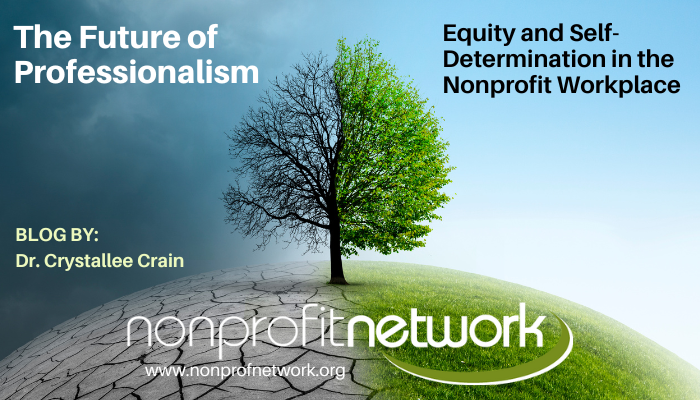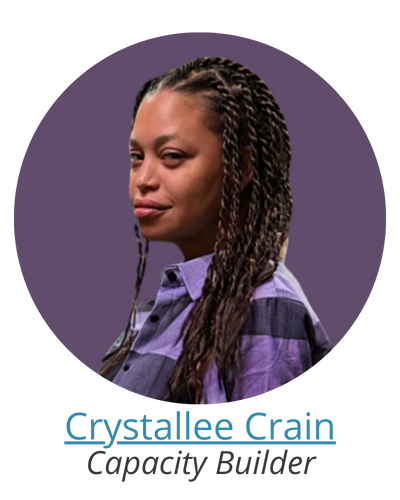The Future of Professionalism: Equity and Self-Determination in the Nonprofit Workplace

The Future of Professionalism: Equity and Self-Determination in the Nonprofit Workplace
As the landscape of the workforce continually changes, nonprofit leaders are invited to reconsider professionalism through the lens of equity, and self-determination into their organizational cultures. These principles not only embody the values of today’s diverse workforce but also serve as critical components for creating inclusive and empowering workplace environments. This blog explores the importance of these concepts and illustrates them through two hypothetical case studies of nonprofit organizations navigating these transformations.
In the mid-2010s, Millennials emerged as the largest demographic group in the U.S. workforce, with their representation swelling to one-third of employees by 2016. With this generational shift came new expectations around workplace norms—Millennials and Generation Z are advocating for increased flexibility, inclusivity, and opportunities for authentic self-expression in their professional lives. Traditional notions of professionalism are being redefined, with rigid dress codes and hierarchical communication styles increasingly called into question.
Dion Bullock, DEIB Strategy Lead at Bravely, writes about the ways that cultural biases often embedded in established norms of professionalism. For example, while facial hair is revered in many cultures, it's often misunderstood in Euro-centric workplace environments as unprofessional. Or the prevalence of tattoos as socially acceptable, in some work environments it is frowned upon, or people are discriminated against. Organizations must reevaluate such standards to foster a more inclusive atmosphere that honors cultural practices and individual expression.
The Importance of Equity
The collective reckoning of 2020 and 2021 highlighted systemic inequities within organizations and propelled many nonprofits to prioritize diversity, equity, and inclusion (DEI) initiatives. Much of this work was possible because of the efforts to make workplaces and other public or private spaces accessible and free of harm, notably anti-workplace violence and anti-bullying campaigns. Employees from marginalized backgrounds have been consistently asserting our rights to spaces that acknowledge and respect their identities, prompting calls for change within organizational cultures. Leaders are increasingly held accountable for addressing historical exclusions and ingrained biases, fostering environments where every voice matters.
As pressures mount for inclusivity, there's an inherent conflict with outdated professional standards that inadvertently stifle individual expression. A Glassdoor guide suggests employees should only speak up in meetings when presenting “valuable and important input,” which may discourage contributions from those who fear marginalization. This poses poignant questions for leaders: How can organizations promote an inclusive culture that also encourages open, authentic dialogue? How are traditional notions of professionalism hindering these conversations? How might more inclusion increase our collective impact?
Embracing Self-Determination Theory
At the core of fostering a more inclusive workplace is self-determination theory (SDT), which asserts that individuals possess three fundamental psychological needs: competence, autonomy, and relatedness. When these needs are adequately met, employees experience heightened intrinsic motivation and job satisfaction.
As workplaces adapt to new realities shaped by remote work, virtual collaboration, and algorithmic management, understanding how these aspects influence worker motivation is crucial to maintain consistency with rampant social and culture changes. For example, remote work may enhance autonomy by allowing employees to create their own schedules, while virtual teamwork can foster a sense of relatedness through collaborative digital platforms.
To illustrate the importance of these principles, we’ll explore two case studies of nonprofit organizations effectively navigating this landscape.
Case Study 1: Green World Initiative
Organization Overview
The Green World Initiative is a nonprofit focused on environmental advocacy, with a team of diverse employees united by a shared passion for sustainability. However, their traditional approach to professionalism emphasized formal attire and strict communication protocols, leaving many employees feeling stifled.
Challenge
In the face of increasing demand for equity and inclusivity, Green World Initiative found its leadership style inadequate to address the needs of its diverse workforce. The rigid professionalism standards led to disengagement and frustration among employees who felt they couldn't express their individuality or cultural backgrounds.
Solution
In response, the leadership adopted a new approach grounded in self-determination theory. They initiated a series of town hall meetings where employees could openly discuss their experiences and suggest changes. This process revealed that many team members wished for a more casual dress code and a more open platform for discussion.
Consequently, the organization implemented a “Dress for Your Day” policy, allowing team members to choose their attire based on personal comfort and the tasks at hand. Additionally, they established guidelines for meetings that encouraged all voices to be heard, fostering a culture of belonging. The results were palpable—employee morale improved, retention rates increased, and the organization began to see a creative surge in ideas and initiatives that better reflected the community they served.
As a result, Hope for Tomorrow saw an increase in innovative programming initiatives that more effectively addressed the needs of the communities they serve. Employees felt empowered to contribute their unique ideas, leading to stronger relationships with the populations they aimed to support.
In a rapidly evolving workforce, nonprofit leaders must redefine what professionalism encompasses and how we intend to hold ourselves and one another accountable for impact and team building. By prioritizing equity and promoting self-determination, it is possible to create inclusive workplaces where authentic expression is celebrated and encouraged.
As evidenced by the experiences of the Green World Initiative and Hope for Tomorrow, organizations that embrace these principles not only enhance employee morale and retention but also improve their overall effectiveness in actualizing their missions.
By advocating for these transformative changes, nonprofit organizations can lead the way in establishing a new standard of professionalism—one that reflects the rich diversity of our contemporary workforce and acknowledges the importance of every individual’s contribution to the greater good.
References
Bullock, D. (2021). https://workbravely.com/blog/diversity-equity-inclusion/its-time-for-professionalism-to-make-room-for-inclusion-and-authenticity/
Deci, E. L., & Ryan, R. M. (2000). *Intrinsic and Extrinsic Motivations: Classic Definitions and New Directions*. Contemporary Educational Psychology. https://selfdeterminationtheory.org/wp-content/uploads/2017/03/2017_DeciOlafsenRyan_annurev-orgpsych.pdf
Gagné M, Parker SK, Griffin MA, Dunlop PD, Knight C, Klonek FE, Parent-Rocheleau X. Understanding and shaping the future of work with self-determination theory. Nat Rev Psychol. 2022;1(7):378-392. doi: 10.1038/s44159-022-00056-w. Epub 2022 May 10. PMID: 35574235; PMCID: PMC9088153.
Glassdoor. https://help.glassdoor.com/s/article/Community-Guidelines?language=en_US
Dr. Crystallee Crain (she/her/hers) is an interdisciplinary public health scholar and human rights advocate. She has over 11 years' experience consulting nationally with clients in a variety of sectors. To talk with Dr. Crain or another consultant about customized services that meet your unique organization needs you can fill-in this brief FORM and we'll get back to you within 3-business days.
Want even more? Click here to sign up for our weekly e-newsletter. Each week you'll get a link to the most recent news, workshops, and sector updates. We promise to respect your time and will not flood your inbox. We only send one e-newsletter each week and when any timely important announcements need to be made.


